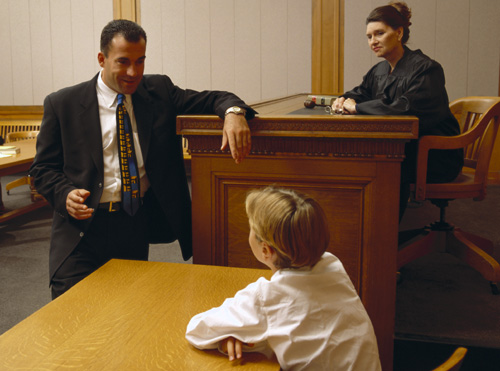Challenging the Credibility of Alleged Victims of Child Sexual Abuse

 Sexual abuse is a terrifying trauma for anyone to have to go through and it is especially worse for children. After having experienced it, they sometimes have to get up onto the stand in court and try to convince the jury that the abuse did happen. The defense attorneys need to prove their client innocent by attacking the child’s credibility. I think that is completely fair but children should not be treated the same way as an adult. The research “Challenging the credibility of alleged victims of child sexual abuse in Scottish courts.” by Zsófia A Szojka, Samantha J Andrews, Michael E Lamb, Stacia N Stolzenberg, and Thomas D Lyon looks at the unrealistic demand that is placed on children’s memory by some of the credibility challenging questions.
Sexual abuse is a terrifying trauma for anyone to have to go through and it is especially worse for children. After having experienced it, they sometimes have to get up onto the stand in court and try to convince the jury that the abuse did happen. The defense attorneys need to prove their client innocent by attacking the child’s credibility. I think that is completely fair but children should not be treated the same way as an adult. The research “Challenging the credibility of alleged victims of child sexual abuse in Scottish courts.” by Zsófia A Szojka, Samantha J Andrews, Michael E Lamb, Stacia N Stolzenberg, and Thomas D Lyon looks at the unrealistic demand that is placed on children’s memory by some of the credibility challenging questions.
1.Could you touch a bit on what the research is for our by audience who may be learning about it for the first time?
This project analyzed real court trials in Scotland that involved children alleging sexual abuse. We wanted to a look at the ways in which defense lawyers, who were representing the accused, challenged the credibility of the children’s testimony during cross-examination, and how children responded to these challenges. We examined the type, source, and the content of the credibility challenges. Here are some examples of credibility challenges:
“Are you making this up?”
“You are saying that your brother was in the room? Why didn’t you say that to the police?”
“You wanted him to be your boyfriend, didn’t you?”
Overall, we found that many of the credibility–challenging questions asked of children by defense lawyers placed unrealistic demands on children’s memory capacities. Their use should be carefully monitored and credibility-challenges that proved particularly difficult for children (e.g., questions that challenged peripheral rather than central details of the allegation) should be avoided. It is important that juries, who determine guilt in these cases, are made aware of the disproportionate effects that credibility-challenging questions can have on the consistency of children’s testimony when deliberating to reach a verdict.
2.What got you interested in doing research on this topic?
I was interested in child development and memory from my experiences of learning about the topics in my first psychology class when I was 16. My interest in these topics, combined with finding classes about eyewitness testimony really and other aspects of forensic psychology completely fascinating, naturally led me to the area of children’s forensic interviewing. I just followed what I enjoyed learning about!
3.How do you think asking children credibility challenging questions is different from asking adults?
Children have different capacities and limitations to adults. Developmental factors that are important to consider when witnesses are required to testify about an alleged account of sexual abuse in court include language abilities, memory and other cognitive abilities, social development, and emotional regulation abilities. Since these factors are still developing in children, and even way into adolescence, it follows that children are likely to be particularly vulnerable to questions specifically designed to undermine their credibility than are adults.

4.What measures do you think should be taken by the court when a child is bought to give testimony?
Generally, it is important that children feel comfortable and supported, and are given the opportunity to give their “best evidence”. This can be achieved by showing the children around the courtroom before they have to give evidence, by a support person being present while the child gives evidence, and even by the children giving evidence via closed-circuit television from another room in the courthouse or from outside the courthouse. The specific measures taken by the court should be be assessed on a case by case basis, because circumstances and children are all very different!
However, there are other measures that courts need to take to ensure that children have the opportunity to give their “best evidence” when it comes to the quality of the questions asked by lawyers. Our research shows that currently not enough is being done by courts in this respect. Questions asked are highly challenging and suggestive, highly repetitious and linguistically complex, and focus to a large extent of peripheral rather than central aspects of the allegations. More extreme measures in the practice of questioning children in forensic settings need to be taken to reduce this kind of questioning to so that it is developmentally appropriate, and to ensure children’s testimony is protected from contamination.
5.In your article you mention that that asking children credibility challenging questions is important as the defendant does have rights and so balance should be found, what balance do you think there should be?
The defense has been accused of a crime and so has the right to challenge the evidence put against them, but at the same time child witnesses have a right to give their “best evidence”. Both of these rights need to be protected.
The types of credibility-challenging questions asked in our Scottish sample protected the defendants’ rights more than the children’s. But there were some types of credibility-challenging questions that children did not seem to struggle as much as other with (e.g., challenges against central rather than peripheral aspects of the allegation). A better balance of rights would be achieved by defense lawyers challenging the evidence put against their client by asking credibility-challenging questions that were open in both form and content, so that children can clearly understand what is being asked of them.
The trouble is, there is a long history in legal settings of traditional, suggestive cross-examination techniques being the norm. Monumental shifts in culture, public policy, and/or practice will be required before a definitive balance is reached.
6.Do you think it would be better, if possible, to avoid bringing the child in court to testify?
Yes. I think children’s testimony should be heard by jurors but I don’t think there is a huge need to make children come to court.
We have the technology nowadays to take their evidence via CCTV, so the children can be somewhere more comfortable than the courtroom or courthouse. It is also possible to take children’s evidence well before trial (which can often take many months or years to get underway) so that the children can move on with their lives. The pre-recording of children’s evidence (Section 28 of the Youth Justice and Criminal Evidence Act, 1999) is currently being piloted, with success, in England and Wales.
7.Where are studies at the moment and where do you anticipate findings going in the next year or so?
Our recent surveys have shown that the general population hold very varied and often inaccurate beliefs about child sexual abuse. As such, we are currently looking at the role that expert witnesses (e.g., psychologists) and judicial instructions can play in court at providing jurors with tools to interpret children’s evidence against what is known on average about child sexual abuse.
We are also beginning to join other researchers to look more at the effectiveness of the role of intermediaries (i.e., independent communication specialists designed to facilitate communication between witnesses and lawyers) in child sexual abuse cases.
I expect that, overall, findings will suggest that these measures have positive effects when used correctly, but can have potentially disastrous effects when not used correctly. I anticipate that our findings will point to the need for further standardized training of practitioners involved in child sexual abuse cases, as well as the need for a cultural shift in how evidence is challenged.
8.Do you have additional resources or further readings for those who want to learn more about the topic?
The best couple of the books to read to get a feel for the topic, that I always recommend, are:
Lamb, M. E., La Rooy, D. J., Malloy, L. C., & Katz, C. (Eds.). (2011). Children’s testimony: A handbook of psychological research and forensic practice. Chichester, UK: Wiley-Blackwell.
Spencer, J. R. & Lamb, M. E. (2012) (Eds.). Children and cross-examination: Time to change the rules? Oxford and Portland, Oregon: Hart Publishing.
I think that it would be best if children did not have to come into the courtroom at all but if there is no other option, then steps should be taken by the courtroom to ensure that the child is getting all his rights to present his evidence to the jury.



I was brutally sexually abused by a teacher in my 5th grade year. He would fondle my chest and/or buttocks in the classroom, the hallway, wherever he could get me alone. I couldn’t tell anyone, because he said he’d kill me if word of his dirty little habit ever got out. To cover it up, he’d recruit students to say I grabbed their crotches, and he’d then force me at knifepoint to confess.